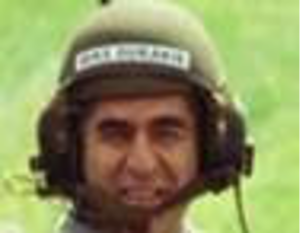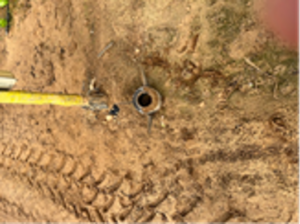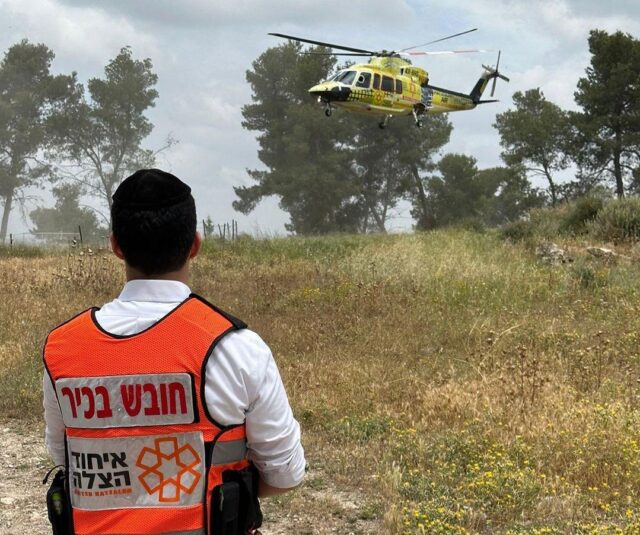To All:
I arrived home last Monday, and someone who is a glutton for punishment asked me to write a “wrap-up” post. But first, for those of you who have given to Hatzolah Air, I’ve attached a video from Aaron Adler, the president of the Israel operation, who took time during his break from Gaza to send his thanks. For those who have not given, it’s not too late and every little bit helps, and here’s the link: Hatzolah Air
How to wrap up? I’ll give an update on some of the many wonderful people I met, and whom I’ve written about in my previous emails. Then I’ll offer a few thoughts about having spent a week in the US, listening to and reading local news.
I have to begin with Eli (Parts I-VI), my guide and guru throughout my time in Israel. He is now in Gaza. Because of his previous position in the Israeli Government, Eli wasn’t officially in the reserves. Before the cease-fire, he had called around to various military units to see if they needed a combat medic. There was a lot of paperwork and then the ceasefire, but he got the call and is down in Gaza today.
Gal was the first medic we met on the Gaza border when we were distributing evac kits (Part I). Apparently, Eli called her to ask her if she had one left. She’s still a center for distribution of the supplies we dropped off and is making sure that everyone gets their share. I think she has a kit for Eli, but she’s been distributing them around to various units as they go in and out.
Aaron (Part IV) runs Hatzolah Air in Israel, and arranged for the barbecue (Part I)
we had for the medics who were heading to Gaza the following day. That’s the last I heard from him, but Eli (Aaron is Eli’s boss) tells me he’s OK.
Moishe is Eli’s brother-in-law (Part II). We drove him from Jerusalem to the Gaza checkpoint when he was called back to duty suddenly. He’s been in and out of Gaza for about three weeks, usually for one-day breaks, so he can get to Jerusalem, say hello to his family, and turn around again.
Shlomo (Part I) is still up north, and his unit has not been that active. Apparently, his unit is still living on cake.
As far as I know, Gilad (Part III) and his unit are still up north. I’m holding in trust the vintage Israeli army helmet I got from his communications officer in exchange for my tactical helmet. We will exchange back when we next see each other. In the meantime, I wear the helmet when I want to do my Michael-Dukakis-in-the-tank impressions. It’s uncanny. 
Dr. Amos (Part I) has had a tough war. He’s treated many soldiers and lost quite a few.
“Yoni” (Part II) is feeling better and apparently recovering from his experiences searching for victims and remains in the Gaza border area right after October 7. He’s in New York wrapping up his affairs there, and then he’ll go back to Israel. If I did one good thing in Israel, it was the conversation with Yoni.
Zvi Mendelsohn (Part IV), one of Israel’s great lawyers and a prince among men, continues to practice during his leaves from duty up north. He sent me an affidavit to sign the other day, and then disappeared again into the military mist.
I have no doubt that Alon Davidi (Part V), the mayor of Sderot, is still running around like a maniac trying to get services to his scattered constituents. He might be on a JPC podcast soon, and he has a lot of interesting things to say.
My friend Carol (Part IV) continues to do well. Her children are also on active duty, and I think they are doing well also. That does not mean that Carol has suffered no loss. Like all Israelis, she has posted memorials to friends of hers, and to friends’ children.
Hila (Part V) and her family are doing well. They still get visits regularly from Rabbi P, his M16, and his Glock. I have no reports on whether Rabbi P got the attachment for his pistol.
Fleur (Part IV) is still on my Fantasy Israel Politics Team. Currently, she is a star and I have her pegged as a future prime minister – see her interview with The JPC on the day of Washington rally. She is making television appearances around the world to great effect. Because of her background (born and raised in Gibraltar), she is a native English and Spanish speaker, so she’s in demand to speak for Israel around the world. She should be doing more in the U.S.
Leon Kass and his colleagues raised money for an (expensive!) ambulatory ICU unit for the Israeli army. Hatzolah Air is looking to purchase one as well to use on its aircraft.
Now, to the news. Since I got back, I’ve been reading and hearing all about “context.” Here are a few points for context from the Israeli perspective.
- There’s no question that what is happening in Gaza is a humanitarian crisis. What’s going on in Israel? I mentioned in an earlier email that the 35,000 citizens of Sderot have been evacuated and are scattered across Israel. That doesn’t include other towns, villages, and Kibbutzim near Gaza that have also been evacuated. And no one’s mentioned the towns up north. Kiryat Shimona and other towns near the Lebanese and Syrian borders have been evacuated. The estimated total is more than 225,000. The difference is that, in Israel, the national and local governments try to get civilians out of harm’s way and provide (or try to provide) at least the basic necessities for the people. Apparently, that’s not a priority in Gaza.
- Different point, same conclusion. I stopped mentioning dangerous situations after my family got nervous after I mentioned the rockets over Tel Aviv in an early email. But the situation in Israel is still somewhat fraught. For example, everyone has an app that tracks where you are and, if you’re in danger, it blasts an alarm. You might be in a city, in the country, driving along a road. Overkill? I thought so, until I got to the farm, near Ashkelon. I had a sleeping bag, and expected to sleep at the farm, but they said that was too dangerous. I scoffed. Then we went out to the fields, which are covered with plastic mesh. There were tears in the mesh, and when we went to investigate, we found pieces of a rocket that had fallen through:

Nothing exploded, because this rocket had been intercepted by some sort of defense system (Israel’s or the US Navy’s in the Red Sea, which has been shooting down rockets and drones repeatedly). So, it really was dangerous to stay on the farm, but the point is the same: Israel does what it can to protect civilians as much as possible. (Even when I went to Hila’s to sleep, in a town much farther north, there were several alarms while I was there. As far as I know, no one was hurt.)
- The press reports about “children” who have been released from Israeli prisons in exchange for hostages. Several times when I was staying in or near the West Bank, there would be a report in the morning that several teens, usually 16 or 17, had been caught overnight trying to get through the fences. They would be turned over to the police, and now they’ve been exchanged for hostages. My guess is that they will try it again, and unless they kill themselves or someone else, they’ll be arrested again, and the cycle will continue. (I read this morning in The Wall Street Journal about a Palestinian family that was run out of their home by an Israeli. I don’t know what happened, or whether the Israeli had legitimate concerns or not. But as I mentioned in a previous email, tensions in the West Bank are extremely high, and trust is very low. I have serious concerns about whether the situation will improve in the near future. But under these circumstances, bad things can and will happen for all kinds of reasons.)
Now for an optimistic note. You may have read that Algeria proposed an anti-Israel resolution in the Arab League and it failed to get a majority. That’s correct: Israel had a blocking coalition in the Arab League. Who’d a thunk it?
And last but not least, Fleur was kind enough to invite me to Shabbat dinner right before I left Israel. I sat across from Ines Demiri, Kosovo’s ambassador to Israel. Being a proud and typical American, I know nothing about Kosovo, except that it was at the center of the 1990s Balkan crisis (Or was that Baltic? No, I checked, Balkan is correct). I asked her about the country, and specifically whether it was Catholic or Eastern Orthodox. She told me that Kosovo is a Muslim country, that she is a Jewish woman who was recruited into the Foreign Minister’s office because of her ties to Israel, that Kosovo has a small Jewish community (low hundreds), and that it is the only Muslim country that has an embassy in Jerusalem. I plan to keep in touch with Ines, and I look forward to going to Kosovo next year.
Love to All,


